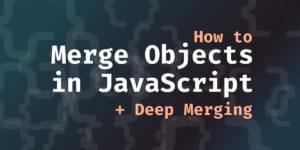jQuery Undetermined String Literal Error
Have you ever come upon this annoying error message: “undetermined string literal”.

Ok, i’ve got 3 occasions were you might run into this error and how to fix it for each specific case.
- Multiple Line Strings
- Wrong String Format (Bad Characters)
- Angle Brackets
Multiple Line Strings
If your trying to assign a string that covers multiple lines to a variable you might see the “Undetermined String Literal” error. To solve this you must use the JavaScript escape character backslash (“”) after each line to tell the interpreter where the line ends and to join the string together.
Another way is to simply split your string up into bits and add them together.
Wrong String Format (Bad Characters)
If your trying to assign HTML to a variable you might see the “Undetermined String Literal” error. It might be that you loaded the HTML from somewhere else via ajax and are now trying to use/inspect it. Use the following code to clean up the bad characters in the string before trying to assign it.
Angle Brackets
If your trying to use angle brackets (“>” & “< “) within a string you might see the “Undetermined String Literal” error when trying to submit the string data via ajax.
var contentQuery = 'first 10 location like "abc"';
//note: abc replaces the actual queryIt turns out it was the securequery angle brackets creating the error and I had to hack it (as such) by adding in the angle brackets (“< ” & “>”) just before encoding and sending the request via AJAX (see below).
$.ajax({
type: 'POST',
url: '/ajax/abc',
data: 'content=' + encodeURIComponent('< '+contentQuery+'>'),
dataType: 'html',
success: function(data){
console.log(data);
//display results
$('#results').html(data);
}
});This might even be a bug in jQuery, not sure though. When you test in firebug it works though! So maybe not…
var fine = 'first 10 location like "abc"';
console.log(fine);Frequently Asked Questions about jQuery Undetermined String Literal Error
What is an undetermined string literal error in jQuery?
An undetermined string literal error in jQuery is a common error that occurs when a string literal is not properly closed or terminated. This usually happens when there is a missing or misplaced quotation mark in the string. The JavaScript interpreter expects the string to be closed, but when it doesn’t find the closing quotation mark, it throws an error. This error can cause your code to break or behave unexpectedly.
How can I fix an undetermined string literal error in jQuery?
Fixing an undetermined string literal error in jQuery involves finding and correcting the improperly closed string. This can be done by carefully checking your code for any missing or misplaced quotation marks. Once you’ve found the error, you can correct it by adding the missing quotation mark or moving it to the correct location. It’s also a good practice to use a code editor with syntax highlighting, as it can help you spot these types of errors more easily.
What are the common causes of undetermined string literal errors in jQuery?
The most common cause of undetermined string literal errors in jQuery is a missing or misplaced quotation mark. This can happen when you’re writing a string and forget to close it with a quotation mark, or when you accidentally place the quotation mark in the wrong location. Other causes can include using the wrong type of quotation mark (for example, using a single quote instead of a double quote), or having a quotation mark within the string itself.
How can I avoid undetermined string literal errors in jQuery?
Avoiding undetermined string literal errors in jQuery involves being careful when writing your strings and always ensuring they are properly closed. Using a code editor with syntax highlighting can also help, as it will highlight any strings that are not properly closed. Additionally, it’s a good practice to always use the same type of quotation mark within a string, and to escape any quotation marks that are part of the string itself.
Can undetermined string literal errors in jQuery cause other problems in my code?
Yes, undetermined string literal errors in jQuery can cause other problems in your code. When a string is not properly closed, the JavaScript interpreter will continue reading the rest of your code as part of the string until it finds a closing quotation mark. This can cause other parts of your code to be ignored or misinterpreted, leading to unexpected behavior or other errors.
What is the difference between single quotes and double quotes in jQuery?
In jQuery, single quotes and double quotes are used to denote string literals. They are essentially interchangeable, and you can use either one as long as you are consistent within each string. However, if you need to include a quotation mark within the string itself, you should use the opposite type of quotation mark to enclose the string.
How can I escape quotation marks in jQuery strings?
You can escape quotation marks in jQuery strings by using the backslash () character. For example, if you want to include a double quote within a string enclosed by double quotes, you would write it as “. Similarly, to include a single quote within a string enclosed by single quotes, you would write it as ‘.
What are template literals in JavaScript?
Template literals are a feature in JavaScript that allows you to embed expressions within string literals. They are enclosed by backticks ( ), and any expression within ${ } inside the backticks will be evaluated and included in the string. Template literals can span multiple lines and include special characters without needing to be escaped.
Can I use template literals in jQuery?
Yes, you can use template literals in jQuery. They can be particularly useful when you need to construct complex strings or include variables within your strings. However, keep in mind that template literals are a feature of ES6, and may not be supported in older browsers.
What is the difference between string literals and template literals in JavaScript?
The main difference between string literals and template literals in JavaScript is that string literals are enclosed by single or double quotes and cannot span multiple lines or include expressions, while template literals are enclosed by backticks and can span multiple lines and include expressions. Additionally, special characters in template literals do not need to be escaped.
Sam Deering has 15+ years of programming and website development experience. He was a website consultant at Console, ABC News, Flight Centre, Sapient Nitro, and the QLD Government and runs a tech blog with over 1 million views per month. Currently, Sam is the Founder of Crypto News, Australia.






